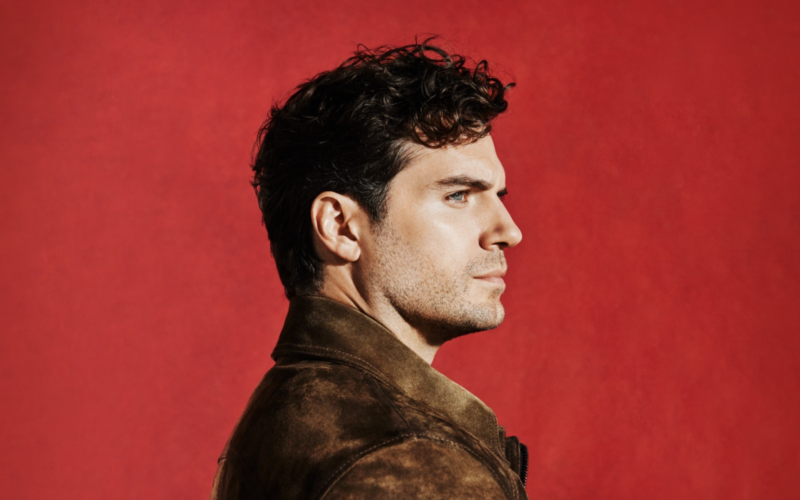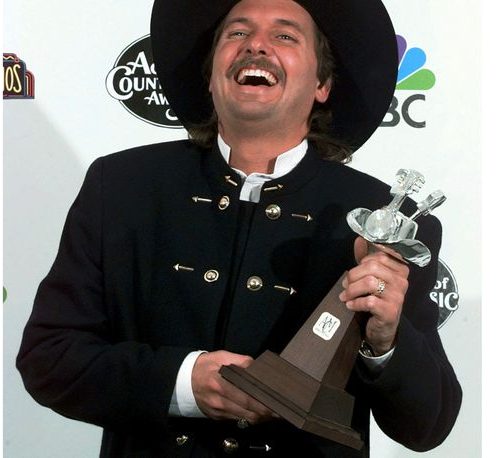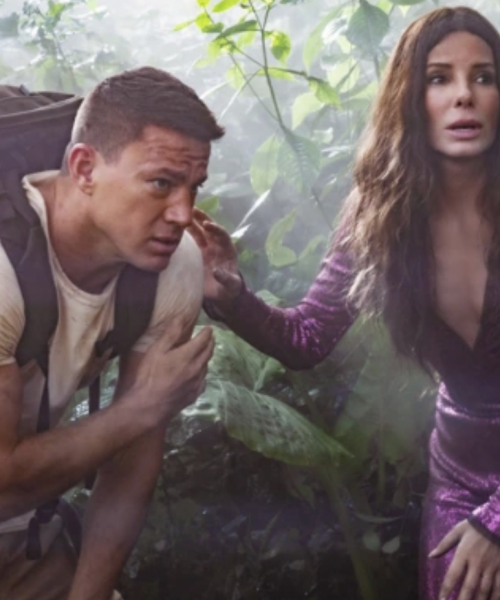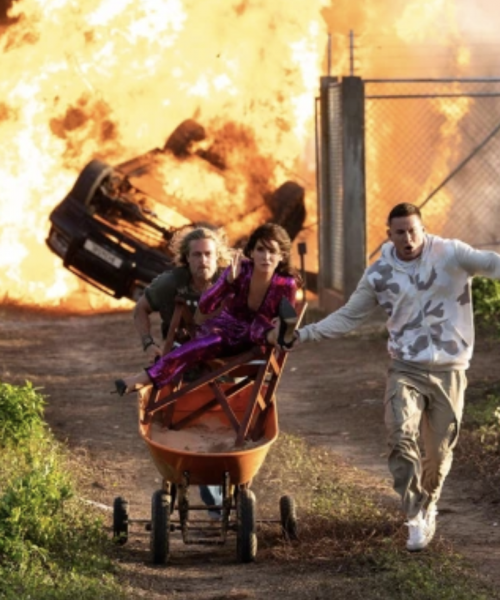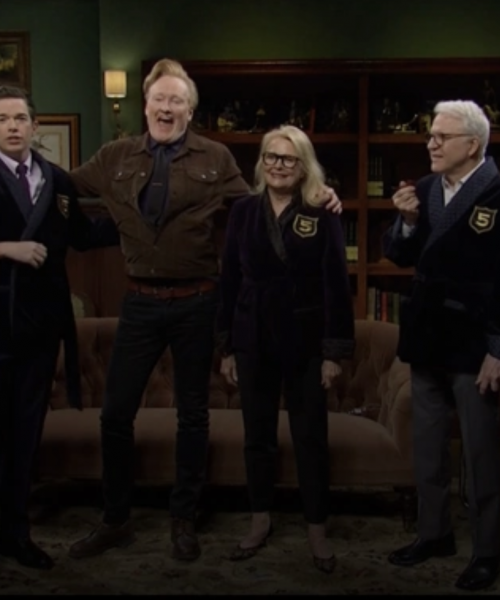BY JAMES HIBBERD | HollywoodReporter.Com
Troy Warren for CNT #Entertainment
The British actor with a soldier’s discipline, a gentleman’s demeanor and a high tolerance for “extreme punishment” opens up about ‘The Witcher’ season 2, ‘Highlander,’ his Superman and ‘Mission Impossible’ futures — and the elusive spy role directors insist he was “born to play.”
Henry Cavill stands in a Miami hotel room looking like a comic book drawing made real.
He’s 6-foot-2 but seems taller because he’s so broad. His muscles stretch an ordinary camel-colored knit shirt into a bulky superhero outfit. “I’m amazed how many people recognize me with a mask on,” the actor says, and it’s unclear if he’s being modest or truly doesn’t know how cinematic he looks — even his wavy jet-black hair with its jagged widow’s peak would give him away (you may recognize this hairline from films such as Mission Impossible: Fallout).
Yet as we sit down for the first of our two interviews, Cavill’s brawn is quickly contrasted by his genteel demeanor that his colleagues say is typical of the 38-year-old Englishman. Take the way the Witcher actor typically starts his days on set: Cavill will select a crewmember, say hello, shake their hand and ask how their day is going. Then he’ll approach another crewmember and do the same — then another and another and …
“It’s to the point where sometimes our ADs are like, ‘OK, we have a huge crew, you can’t ask everyone,’ ” says The Witcher showrunner Lauren Schmidt Hissrich.
Explains Cavill: “A set is often rush-rush-rush, and we forget the basic human decencies. I want people to know I respect everything they do and they’re just doing a job like I am. To me, it’s just respect and good manners.”
It’s a characteristically nonchalant answer from somebody whose approach to his work is anything but casual. From Cavill’s recent selection of roles to his work ethic to his social media engagement, his strategic deliberation reflects the hard-core gamer that he is.
He’s played Superman in a trio of DC films (which have grossed more than $2 billion), launched The Witcher franchise (Netflix’s most watched original series until Bridgerton came along) and had a scene-stealing turn in 2018’s Mission Impossible: Fallout (which brought in $800 million worldwide as the highest-grossing film in the franchise). All of this has positioned Cavill as arguably the biggest action hero in the world who isn’t a household name — yet.
Zack Snyder calls Cavill “a warrior monk.” Fallout director Christopher McQuarrie sees Cavill a bit differently: In a town full of celebrities, “Henry is a classic movie star.”
“It’s not like there was something in the water in the 1930s and ’40s that there isn’t today,” McQuarrie says. “Movie stars are not as abundant now for two simple reasons: The industry wanted and cultivated stars, and there were people ready to do the work required to be stars. Henry is in the category of somebody hell-bent on doing the work, and that work is hard.”
Cavill is certainly working more than ever, set to star in John Wick director Chad Stahelski’s reboot of the action-fantasy Highlander, reprise his role as Sherlock Holmes in the Netflix sequel movie Enola Holmes 2, and head the all-star cast of Kingsman director Matthew Vaughn’s spy thriller Argylle. And Dec. 17, The Witcher returns for season two (with Cavill having just signed a new deal paying more than $1 million per episode, sources say). There’s also never-ending speculation that Cavill might be in line to play the most highly coveted character in action cinema — James Bond.
For his part, Cavill acts vaguely perplexed by all this. “Something has changed, something has shifted,” he says of his busy coming slate. “After 21 years of hard work, I have three jobs lined up. Maybe it’s me, maybe it’s my approach, maybe my value as a commodity increases being attached to things like The Witcher. Now I can really focus on the storytelling and grow from here.”

Snyder recalls the moment when he was sure that the relatively unknown Cavill was right for the career-making role of Superman in Man of Steel. It was 2010, and the director was shooting some test footage with the actor to present to the studio. He asked Cavill to try on one of Christopher Reeve’s original spandex suits from the 1980s Superman films.
“When you see the suit on the ground, it’s kind of shriveled up, it’s just spandex, it looks like, ‘Oh God, that’s not going to be cool,’ ” Snyder says. “Henry put it on in this trailer. And there’s a version of this where he comes out and is like, ‘I’m Superman!’ and you’re like, ‘OK, it’s Halloween.’ But Henry came out and even the crusty grips we hired for the test got quiet. Everybody was heart-attack serious. He had just the right energy. We were like, “Oh, he’s Superman. That’s what Superman looks like.’ “
Cavill says he was thinking something else. “If I’m going to be honest, what was going through my mind was, ‘Lord, I’m too fat to be wearing this suit right now,’ ” Cavill says dryly. “And also, ‘I can’t believe I’m actually doing this’ — there was a sense of excitement, achievement and nervousness.”
Man of Steel was a success, and fans clamored for a direct sequel, but Warner Bros. seemed intent on following Marvel’s Avengers playbook with multicharacter mashup titles such as 2016’s Batman v Superman: Dawn of Justice and 2017’s Justice League, the latter of which underperformed critically and financially to the point that the studio reshuffled its executive ranks and slate plans.
True to form, Cavill largely avoided engaging on the controversies that followed Justice League, such as the reports of replacement director Joss Whedon’s abusive on-set behavior, though he did acknowledge in an interview that the theatrical cut “didn’t work.” He now says Snyder did a “wonderful job” with his Snyder Cut re-edit.
In May, DC announced the development of a Black Superman film, making Cavill’s return as the superhero icon even more uncertain. “It’s exciting — Superman’s far more than skin color,” Cavill says. “Superman is an ideal. Superman’s an extraordinary thing that lives within our hearts. Why not have multiple Supermen going on? Joaquin Phoenix did a wonderful Joker movie; so what if it’s not tied to the rest of [the franchise]? They have multiple Superman comic book storylines happening at the same time.”
Yet the lack of follow-up to Man of Steel does nettle the actor — it feels like unfinished business. The film ended with Superman breaking his moral code to kill the villainous General Zod, a highly controversial decision among fans that was setting up a follow-up storyline.

“There is still a lot of storytelling for me to do as a Superman, and I would absolutely love the opportunity,” Cavill says. “The killing of Zod gave a reason for the character never to kill again. Superman falling to the ground and screaming afterward — I don’t think that was originally in the script, but I wanted to show the pain he had. I did far more emotional takes they didn’t choose; tears were happening. He just killed the last remaining member of his species. That’s the choice he made in that moment, and he’ll never do that again. There’s an opportunity for growth after that, to explore the psyche of Superman as a deep, seemingly invulnerable god-like being but with real feeling on the inside. As I always say, ‘The cape is still in the closet.’”
When franchise actors dip into geekdom, you often get the sense their enthusiasm is a dutiful part of the job. But Cavill passionately discussed at length the journey of Kal-El — a character he hasn’t played in years —and you realize: Oh, this guy really is a gamer geek. He might look like he was created by a secret British AI program as a masculinity template, but he cares about the fantasy worlds he inhabits. Hell, he even named his dog Kal.
Cavill spent his teenage years playing rugby while attending the Hogwarts-esque Stowe boarding school in the oft-filmed pastoral county of Buckinghamshire. The son of a stockbroker father and a mother who taught aromatherapy and massage before working as a secretary, he intended to enlist in the military like a couple of his older siblings (he’s the fourth of five brothers). “If acting had not snatched me up at 17 years old from boarding school, there’s a very high chance that I would have joined the Royal Marines,” he says.
Then, when he was 16, Russell Crowe came to his school to film A Beautiful Mind. Cavill boldly approached the Gladiator star, introduced himself (direct, polite, handshake — even back then) and said he would like to be an actor and asked Crowe for advice. Crowe’s reply wasn’t particularly meaningful, but later he generously sent Cavill a gift package that included a card signed with this encouraging message: “A journey of 1,000 miles begins with a single step.”
The following year, Cavill caught the eye of a casting director visiting his school and landed a role in 2002’s The Count of Monte Cristo. His first part of real significance was being cast in 2007 as a series regular on Showtime’s The Tudors, and a couple of years later he scored his first big-screen lead in a major release with the fantasy film Immortals.
Even early on, directors noticed the actor’s soldier-like ethos. “What I love about Henry is he’s a very serious person who doesn’t take himself seriously,” says director Vaughn, who first worked with Cavill on 2007’s Stardust. “He has a military discipline and a soldier’s sense of humor.”
He also has a soldier’s endurance.
In 2017, Cavill was hanging off the side of an Airbus BK17 helicopter in New Zealand, standing on the skid with freezing, below zero-degree wind blasting in his face and firing a SAW machine gun. By this time, the actor had played Superman and starred in The Man From U.N.C.L.E. and was now filming Fallout opposite Tom Cruise.
He was supposed to be receiving instructions from McQuarrie, but even with his earpiece cranked as loud as possible, he could barely understand a word with those chopper blades roaring and had to largely wing his performance.
Cavill, his ear ringing with tinnitus, would go back up, again and again, privately drawing on his childhood military ambitions, thinking about how elite soldiers survive boot camp. “It’s what they call mental stamina — because what you believe is your physical boundary is actually just a mental boundary,” Cavill says. “It was extraordinarily uncomfortable; my body did not want to keep getting back in the helicopter, but I just kept doing it.”
Recalls McQuarrie: “It was an extreme form of physical punishment. We would get back to base camp and his face was literally frozen and he couldn’t make facial expressions. I don’t know another actor who would do that — not only do it, but do it with full commitment and never complain.”
McQuarrie offers solid evidence: The brutal four-minute bathroom brawl with Cavill’s character August Walker and Cruise’s Ethan Hunt in Fallout was originally going to include another well-known male actor in the sequence’s third role.

The idea was that audiences would be surprised that Hunt and Walker’s target was played by this other actor, then would be even more shocked when the character was abruptly killed off. The actor was put into a “fight evaluation” but couldn’t keep pace with Cruise and Cavill — which is why one of the film’s stuntmen, Liang Yang, was cast as the scene’s third fighter. “It’s a sequence other actors, when learning the level of commitment required, simply opted out,” McQuarrie says.
Yet Cavill brought more to his Fallout role than his physical toughness. The mustache-and-stubble look? Cavill’s idea. That meme-worthy fist-cocking move? Improvised. Walker’s subtle wit? McQuarrie rewrote the character to take advantage of Cavill’s dry sense of humor, which has so far been the actor’s most underutilized onscreen asset (Cavill even got the franchise’s only F-bomb). “The end result was that you had a ‘bad guy’ in the movie who never lost that leading man appeal,” McQuarrie says.
Walker was killed off in Fallout, a move that McQuarrie says fans have given him endless grief about on social media, yet the franchise has methods of bringing back familiar faces. Cavill doesn’t appear in the upcoming seventh film, but an appearance in the planned eighth film remains possible. “I’m in the process of rewriting Mission: 8 right now, this afternoon I could turn a page and any actor from the past could come back,” the director teases. “There is no such thing as death in movies, only unavailability.”
Chasing a high-commitment, long-running TV series just as one’s film career is taking off might seem like an odd move. But when Netflix announced a series based on Andrzej Sapkowski’s Witcher books and video games in 2017, Cavill lobbied hard for the role. He was a fan of the Witcher games and always played them like he does all console titles — on their hardest modes, restarting the levels over and over, trying to fully master them. And isn’t the ultimate Witcher challenge playing Geralt of Rivia in a show?
“I pursued, pursued, pursued,” Cavill says of the role. “A couple months after they had gone through their casting process, my agent called and said, ‘They’ve asked you do an audition — you don’t have to do this.’ I’m like, ‘I’ll do it.’ They said, ‘Really? Are you sure?’ I said, ‘Of course. It’s The Witcher.’”
In the series, Rivia is a stoic, silver-haired monster hunter for hire who wanders a fantasy world. In season two, he mentors a young princess (Freya Allan), and they journey to the fortress where he was trained.
“He knows he is No. 1 on the call sheet, and there’s a great responsibility that comes with that,” showrunner Hissrich notes. “A lot of times that person can make the show a hurricane that revolves around them. Henry works hard to make that not so. He’s on time. He always knows his lines. He always knows his choreography and certainly always knows his action.”

After the success of season one (which included spawning several spinoffs in development), Cavill sent Hissrich a flurry of emails with ideas for how to take the second season to the next level. “The lockdown was an opportunity to look at everything — let’s review that,” Cavill says. “How about we tweak it this way? How about we adapt that?”
In particular, Cavill wanted Geralt to open up more to the audience. “A lot of the notes he was sending to me were about Geralt’s dialogue — could he, first of all, say more,” Hissrich says. “Everybody came out of season one laughing and loving Geralt’s fuming. But Henry was saying that when you read the books you spend a lot of time in Geralt’s head. So how can we put that on the page? Meanwhile, I wanted to tell the story of him becoming a father figure to Ciri. So those two things coalesced wonderfully. He opens up to get Ciri to trust him, by speaking his mind and his heart more.”
Then came the day in December when Cavill was sprinting through the woods for a scene.
“I remember Henry stopping up short and all of us going, ‘Did he trip? Was there a rock?’ ” recalls Hissrich. “I went to his trailer and he said he was in a great amount of pain.”
Cavill tore his hamstring — a nightmare scenario for a warrior monk signed up for a slate of action titles. “It was a very, very bad tear, and I was very lucky that it wasn’t a complete detachment of the hamstring,” he says.
The Witcher’s schedule was shuffled to push Cavill’s action scenes to the end of production, but the actor had to continue to work through his recovery, doing physical therapy in the early morning before going to set at 7 a.m. “The difficulty was working while I was injured,” he says. “Because I wanted to do more for the production — I know how important it was for them to get stuff done. So it was having to find that balance between, ‘Yes, let’s push, push, push,’ and, ‘Whoa, hold on, if I tear this further, it’s the end of my action career.’ That was my worst moment of the past year — professionally.”
The physical endeavor Cavill isn’t prepared to embrace is stripping down in a show that otherwise features plenty of character nudity. “It would have to be particular, it would have to be specific to the storytelling,” Cavill says. “I would say there’s not the space for it.”
Based on the first batch of advanced episodes, The Witcher has a more confident second season, with Geralt’s personality shining through a bit more, and a far easier-to-follow linear narrative instead of the first season’s Dunkirk-like multi-timeline format. “What I’m most proud of is that when you watch the show, it’s not a season that screams, ‘We shot in a pandemic and there’s only two people in every scene and Henry will never do action again because he injured his leg,’” Hissrich says. “You see none of that.”

When asked about his best and worst moments, Cavill is careful to delineate his interview boundaries by prefacing replies with “Professionally …” — suggesting there are personal moments that might mean more to him than his career peaks and valleys, but you’re not going to hear about them.
In that way, he is a bit Superman-like: He keeps his work life and private life very distinct. The actor will swoop down onto a set, heroically crush his duties, then retreat to his Fortress of Solitude in South Kensington, all while occasionally issuing noncontroversial Instagram posts about topics like working out, cooking or literally a poem. When asked about his typical day when not working, Cavill’s reply could be just about anybody’s (walk his dog, meet his brothers or friends for lunch, have a couple beers …).
“I tend to slip off the radar when not working,” Cavill says. “I’m a private person and a family person. The spotlight is beneficial, but it can also be exhausting. I like to put my feet up without being concerned with how I’m being perceived or what I’m putting out there, and I can do that in a private space with friends and family. We’ve seen plenty of celebrity events where somebody’s lost their temper, and I’m sure a lot of that comes down to the feeling of being exposed.”
Such sensitivity might partly stem from a 2018 GQ Australia interview for which Cavill was blasted and apologized for a comment he made about how the #MeToo movement made him nervous about approaching women lest he get accused of assault (“I think a woman should be wooed and chased, but maybe I’m old-fashioned for thinking that”).
But this year, he went Instagram official with his relationship with Natalie Viscuso, 32, an executive at Legendary Entertainment (the studio produced Man of Steel and Enola Holmes), and posted a romantic photo of the two playing chess. In a rare public expression of mild anger, he also chided some fans for their social media criticism of their relationship. (“It’s time to stop,” he wrote. “It causes harm to the people I care about most. … Even your most conservative of negative assumptions about both my personal and professional life just aren’t true. I am very happy in love and in life. I’d be enormously grateful if you were happy with me.”)
During the pandemic, Cavill briefly got confessional and exposed a couple more secrets — that he paints Warhammer model miniatures and has built a gaming PC. Even those disclosures felt like careful choices; hobbies that naturally endeared him even more to the fantasy fan community.
Occasionally, even an in-bounds question trips Cavill’s alert trigger, such as when asked, “What is a decision that you regret?” … you know, professionally. At first, the actor dodges — a variation on “every decision was great because it led me to here.” But then he offers something. “There’s a scene at the end of Man of Steel,” he says. “I’m talking to Martha. I would’ve smiled differently. Every time I see it I’m like, ‘That’s an irritating smile.’ I just don’t like it. Why did I smile like that? That’s not how I smile. That I would have done it differently.”
It’s a fun answer. It’s also a Cavill version of the classic job interview strategy — when asked, “What’s your biggest weakness?” the safest reply is a variation on, “I’m a perfectionist,” or in this case: The tiniest thing that nobody ever noticed wasn’t quite good enough.
So I ask another way: What is something that you wish you had known at the beginning of your career that you know now?
This time, Cavill asks for a moment to think about the question. He goes silent. He gazes at the carpet, looking a bit like a Westworld robot that’s powered down. Seconds tick by. Is this awkward? Well, yeah. I’m sitting with Superman in a hotel room and absolutely nothing is happening and it feels like something has gone terribly wrong in this interview, even though it hasn’t (has it?), but damn this is uncomfortable and probably my punishment for not simply asking another Witcher question. The tape recorded Cavill’s contemplative pause as lasting 42 seconds, but I’d have sworn it was at least two minutes.
“As a person, I’m quite … ‘naive’ isn’t the right word, but I’m very trusting and open,” he says finally. “I wish I’d been a bit more business savvy and smart and realize everyone has their own thing going on. I wish I had a better business mentor from an earlier age.”
The implication is that he was taken advantage of. But pressed about the specifics, Cavill again demures — politely, of course.
Later, I ask a few of his colleagues: What’s Cavill really like when he’s not “on”?
“What you’re hearing when he’s being very careful — he’s not being political, it’s sensitivity,” McQuarrie says. “Henry is a gentleman.” And in a hyper-sensitive, ultra-scrutinized time where any project can be imperiled by the slightest whiff of controversy, a lack of offensiveness is arguably a performer’s greatest career superpower.
***
One coveted IP has so far proved elusive for the very British gentleman, and it seems like such an obvious fit that the biggest obstacle to it happening is that it’s perhaps too obvious. He’s got the physicality, the charm, the work ethic. McQuarrie puts it point blank: “He’d make an excellent Bond.”
Vaughn agrees — so much so that the director cast Cavill as a globe-trotting spy in his upcoming Apple TV+ film Argylle. The movie is Vaughn’s ode to 1980s action thrillers like Die Hard and Lethal Weapon, with Cavill playing an ’80s-style spy (he even has a flattop haircut), except it’s set in the modern world.
“I needed someone who was born to play Bond — which Henry is — and then nick him before Bond did,” says Vaughn, who sees Argylle as a potential franchise. “He plays a larger-than-life action hero with a wink. It’s very different from Kingsman.”
Still, we have to ask Cavill — for perhaps his hundredth time in media interviews — about his level of interest in the role that Daniel Craig officially surrendered with No Time to Die.
“Look …” Cavill begins, then stops and self-edits. “I hate it when people start a sentence with, ‘Look …’ — it sounds like they’re lying about something.” He continues: “I think it would be very exciting to have a conversation with the producers. … In an ideal world, I’d never have to turn anything down. Nothing is off the table. It’s an honor to even be part of that conversation.”
Cavill is currently filming Netflix’s Enola Holmes 2 with star Millie Bobby Brown, which will air in 2022 (“Enola goes out into the world and has more interaction with [Sherlock] now that she’s established herself as a character; we dive deeper into their relationship,” he says). Next year he’s expected to shoot Highlander, a new version on the immortal swordsman action-fantasy (which sources say netted the actor at least a $5 million payday). Cavill says Stahelski’s vision is a more grounded-in-reality take than the original movies and show, and will play a bit more like a modern tragedy, while the director says there were several reasons there could be only one actor for the role.
“Henry obviously has the physicality, but that doesn’t mean a whole lot if you can’t also carry the empathy of a character that’s lived 500 years, and I needed somebody who could do both,” Stahelski says during a break from filming John Wick: Chapter 4, a franchise he says was partly inspired by the playful, magical realism tone of Highlander. “The character’s arc spans hundreds of years and he becomes many different personalities, all of which extend the timeline of his emotional growth. Then during our first meeting, my suspicions were confirmed: Henry was immediately riffing on the idea of the burden of immortality and you could see in his eyes that he can transform himself from being a young, vibrant soul to an old, wise soul. He had this combination I was fascinated by. The other thing you could see was his genuineness – he really loves the property and loves what he believes he can do with it, and when an actor has that level of passion, you’re going to get something unique. And finally – you’ve met him, you know – after 10 minutes you’re just like: ‘He’s cool, I want to hang out with this guy.’”

He also has The Witcher season three (which will add more of Cavill’s dry wit, Hissrich says), and the actor remains committed to supporting Hissrich’s vision to keep The Witcher going for at least seven seasons. “Absolutely,” Cavill says. “As long as we can keep telling great stories which honor [author Andrzej] Sapkowski’s work.”
And if Superman is in a holding pattern, what about Cavill switching teams and joining, say, a Marvel movie? Which character, hypothetically speaking, would he want to play?
“I’m never going to say a Marvel character that is already being played by someone else …”
Yes, yes, we all realize that by now …
“… because everyone’s doing such an amazing job. However, I have the internet and I have seen the various rumors about Captain Britain and that would be loads of fun to do a cool, modernized version of that — like the way they modernized Captain America. There’s something fun about that, and I do love being British.”
What almost all his projects, real and hypothetical, have in common is they’re action titles. Even after his career-imperiling leg injury, Cavill says he’s fine with the idea of continuing to swordfight and jump and sprint into his 50s — like Cruise. Why stay still when you can run, fight and fly? Why show up unless you’re willing to play at the hardest level?
“I’m very happy to keep doing movies that use action as a form of storytelling, and I have no particular desire to say, ‘I just want to do drama now,’ ” Cavill says. “I enjoy being in the best shape of my life, year after year, despite the injuries. I want to be pushed so I can get better. I don’t want to sit down.”

In Other NEWS


























